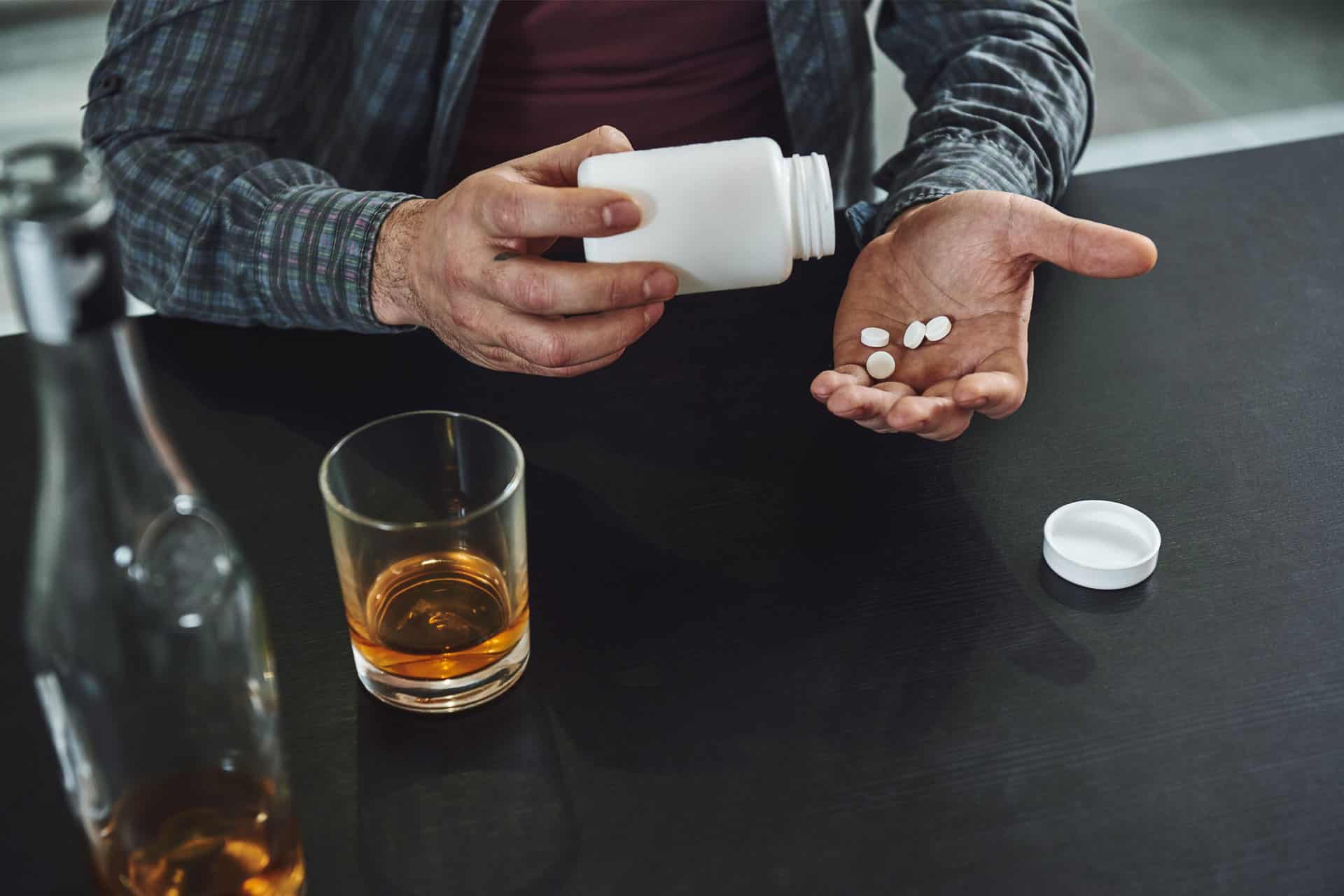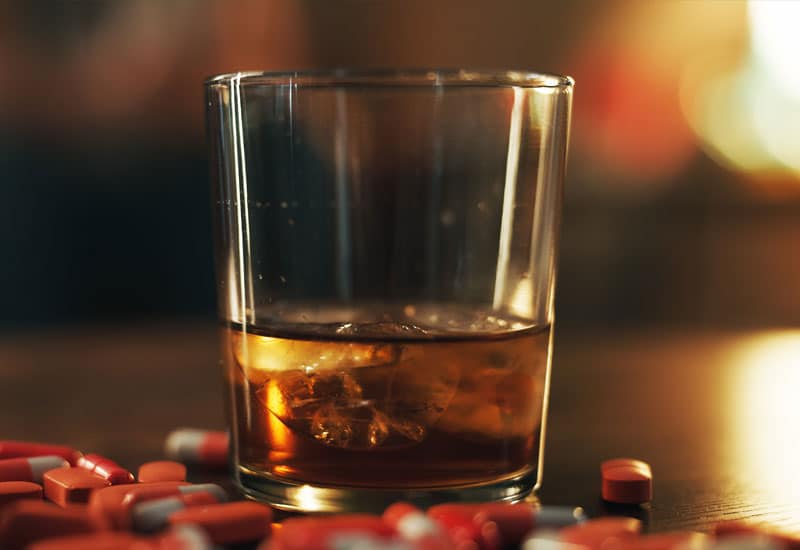Trazodone and Alcohol Don’t Mix: Here’s Why

What you will learn
- You should never drink alcohol while taking Trazodone, even in small amounts.
- Trazodone is an FDA-approved serotonin receptor antagonist used to treat major depressive disorder.
- Trazodone is commonly prescribed off-label to treat insomnia, although it is not FDA-approved for this indication.
- There are inherent risks of Trazodone, such as serious side effects, drug interactions, and risk of overdose. Alcohol can increase these risks.
- Mixing Trazodone with alcohol can pose additional risks, such as the risk of falling, liver damage, and worsening depression.
- Alcohol use disorder can be treated, but it may require professional rehabilitation services, including medically-assisted detox.
Trazodone and Alcohol: Can I Take Them Together?
Trazodone and alcohol don’t mix. If you’re taking Trazodone for depression, you should avoid drinking alcohol. Mixing these two substances can strengthen the effects of each and lead to adverse impacts such as accidents, injuries, health complications, and overdose.
What Is Trazodone?
Trazodone is a member of a class of drugs known as serotonin receptor antagonists. It’s FDA-approved to treat major depressive disorder, and it works by balancing the amount of serotonin in the brain. Trazodone is more commonly prescribed off-label to treat sleep disorders like insomnia or other sleep problems. [1]
Trazodone Dosages and Instructions
Trazdone is FDA-approved to treat major depressive disorder. If you’re prescribed this medication for depression, your healthcare provider will likely start you on an initial dose of 150 mg per day. [2] This dose will be divided so you can take it throughout the day.
It’s advised to take Trazodone after a snack or light meal. If you don’t respond to the initial dose, your doctor may recommend increasing it by 50 milligrams every three or four days until the drug begins to work. Never increase your dose on your own; only under the direction of a medical professional. It may take up to two weeks for Trazodone to begin addressing symptoms of depression.
The maximum dosage of Trazodone is 400 milligrams per day for outpatient use and 600 milligrams per day for inpatient use. If you begin responding to treatment and are doing well on the medication, your healthcare provider may gradually reduce the dose to maintain your condition. It’s generally recommended to take the lowest dose of Trazodone possible while still maintaining its benefits.

What to Know About Taking Trazodone
Serious Side Effects of Trazodone
When taking Trazodone, there are some things you need to know about this antidepressant medication, including some of the side effects to look out for. While common side effects might include fatigue, a stuffy nose, and constipation, there are other, more serious side effects associated with this drug. Side effects that warrant a call to the doctor include: [3]
- Hives or signs of an allergic reaction
- New or worsening symptoms of depression
- An erection that lasts six hours or more, or is painful
- Easy bruising
- Unusual bleeding
- Atypical thoughts or behaviors
- Shortness of breath
- Pounding heart
- Dizziness
- Faintness
- Confusion
- Severe weakness
- Slurred speech
- Suicidal thoughts
Risk of Serotonin Syndrome
Since Trazodone interacts with the brain chemical serotonin, it poses a risk of serotonin syndrome. This syndrome is a result of too much serotonin in the brain and can be life-threatening. Signs and symptoms of serotonin syndrome include: [4]
- Rapid heart rate
- Agitation
- Hallucinations
- Muscle stiffness
- Muscle twitching
- Sweating
- Shivering
- Loss of coordination
- Vomiting
- Diarrhea
- Fever
- Nausea
Trazodone Withdrawal Symptoms
If you’ve decided to stop taking Trazodone, tell your doctor. They may want to taper your dose to prevent uncomfortable or dangerous withdrawal symptoms, including: [5]
- Headache
- Nausea
- Flu-like symptoms
- Dizziness
- Insomnia
- Confusion
- Anxiety
- Mood disturbances
Trazodone Drug Interactions
Alcohol isn’t the only substance that should be avoided while taking Trazodone. Other medications may cause dangerous drug interactions, including: [6]
- Any other antidepressant
- St. John’s Wort
- Tramadol
- Diuretics
- Blood thinners
- Phenytoin
- Anxiety medications
- Medications for schizophrenia
- Migraine medications such as Maxalt, Treximet, and Imitrex
Trazodone Disease Interactions
Always tell your doctor about any other medical conditions you have before taking a new prescription. Trazodone might not be safe to take if you have certain health concerns or conditions, such as: [7]
- Liver disease
- Kidney disease
- Bipolar disorder (formerly, manic depression)
- Substance use disorder, including alcohol use disorder
- Heart disease
- Recent heart attack
- Epilepsy or seizures
- Narrow-angle glaucoma
- Long QT syndrome
- A bleeding or blood-clotting disorder
- Suicidal thoughts
Dangers of Mixing Trazodone with Alcohol
There is no safe use of alcohol while taking Trazodone. Even one or two drinks can cause serious adverse effects. [8]
Risk of Injuries from Falls
Studies show people who take Trazodone are at an increased risk of falls, especially senior citizens. [9] Using alcohol while taking this antidepressant medication may increase this risk. Falls are responsible for many life-threatening injuries, especially among the elderly.
Risk of Trazodone Overdose
Trazodone has sedative effects and can cause CNS depression, especially at higher doses or when combined with other CNS depressants like alcohol, but it is not classified as a primary CNS depressant. Taking them both together increases the risk of Trazodone overdose. If you or a loved one is taking Trazodone, it’s essential to be aware of the signs of a potentially fatal overdose: [10]
- Extreme drowsiness
- Vomiting
- Prolonged or painful erection
- Rapid or pounding heartbeat
- Seizures
- Slowed breathing
- Coma
Other substances besides alcohol can also increase the risk of a fatal Trazodone overdose, including barbiturates and sedatives.
Worsening Depression
Both Trazodone and alcohol pose a risk of worsening depression, so taking them both together increases this risk. To make matters worse, Trazodone can cause suicidal thoughts in specific populations, such as teens and young adults. It’s critical to notify a healthcare professional right away if you experience any of the following mood changes: [11]
- Hostility
- Aggressive behavior
- Increased restlessness
- Increased anxiety
- Panic attacks
- Hyperactivity
- Feeling more depressed
- Irritability or agitation
- Thoughts of self-harm
- Thoughts of suicide
Liver Damage
Both Trazodone and alcohol can cause liver damage, so consuming both at once can pose an even greater threat to the liver. Liver toxicity with Trazodone is rare but has been reported in isolated cases, usually associated with preexisting liver dysfunction or overdose. Liver disease or damage doesn’t always cause symptoms, but when it does, there may be signs such as: [12]
- Swelling in the legs/ankles
- Yellowing of the skin or eyes
- Easy bruising
- Constant fatigue
- Dark urine
- Pale stool
- Loss of appetite
- Pain or swelling in the abdomen
- Itchiness
- Nausea
- Vomiting
Other Medications to Avoid With Alcohol
Drinking alcohol not only interacts with Trazodone. It can worsen the side effects and adverse risks of many other medications, including: [13]
- Selective serotonin reuptake inhibitors
- Serotonin and norepinephrine inhibitors
- Buspirone
- Hydroxyzine
- Tricyclic antidepressants
- Benzodiazepines
- Melatonin
- Diphenhydramine
- Doxepin
- Ambien
- Ramelteon
Signs of Alcohol Addiction
If you’re thinking about taking Trazodone and you’re having a hard time abstaining from alcohol, this could be a sign of substance abuse or addiction. Other signs of alcohol use disorder may include: [14]
- Increasing alcohol consumption to get the same level of intoxication (i.e., building tolerance)
- Intense cravings for alcohol
- Giving up other activities you enjoy because of drinking
- Using alcohol in risky situations (e.g., drinking and driving)
- Spending a lot of time acquiring alcohol, drinking alcohol, or recovering from alcohol consumption
- Failing to meet deadlines or other responsibilities due to alcohol use
- Unsuccessful attempts to reduce the amount you drink or to stop drinking.
- Continuing to use alcohol even though it’s causing problems in your life
If you’re trying to quit drinking, it’s best to seek assistance from a substance use and rehabilitation counselor. Quitting on your own could lead to potentially life-threatening withdrawal symptoms. A treatment center can provide a medically-assisted detox so that you can quit safely and comfortably. Medical detox typically includes around-the-clock supervision by a staff of medical professionals.
Alternatives to Trazodone
If you do drink alcohol or have a history of alcohol use disorder, tell your doctor. There may be safer alternatives to treat depression or insomnia. Both conditions often respond well to healthy lifestyle changes, particularly increased exercise and improved sleep hygiene. A healthy diet including lean proteins, leafy greens, and whole grains may also have a positive effect on mood and sleep quality. Avoiding both alcohol and caffeine could also assist with recovery. Be sure to talk to your doctor before starting a new diet or exercise program.
Ready to get help for you or a loved one? Contact us
To ensure accuracy and quality, every contributor to the Alpas Wellness resource library undergoes a thorough evaluation of their experience, credentials, and achievements prior to publication.
Frequently Asked Questions About Trazodone and Alcohol
What antidepressants can I take with alcohol?
It’s not recommended to mix any other antidepressants with alcohol, as they can worsen the side effects and present different risks, such as the risk of a fatal overdose.
What other sleep aids can I use with alcohol?
It’s not safe to take sleep medications and alcohol together. This is true for Trazodone and any other sleep aids, whether over-the-counter or prescription drugs.
What is alcohol rehab like?
Alcohol rehabilitation may look different depending on where you are in your recovery journey and what treatment center you choose. Some standard rehab services include inpatient care, medical detox, intensive outpatient treatment, and aftercare or relapse prevention services. Residential treatment programs are also available for people interested in sober living.
[1] [8] [13] Trazodone and alcohol: What to know about this risky combination – goodrx. (n.d.-w). https://www.goodrx.com/trazodone/trazodone-and-alcohol
[2] [3] [4] [6] [7] [10] [11]Trazodone uses, dosage, side effects & warnings. Drugs.com. (n.d.-v). https://www.drugs.com/trazodone.html#dosage
[5]Antidepressant discontinuation syndrome – goodrx. (n.d.-a). https://www.goodrx.com/classes/ssris/antidepressant-discontinuation-syndrome
[9] Jung, Y.-S., Suh, D., Choi, H.-S., Park, H.-D., Jung, S.-Y., & Suh, D.-C. (2022, February 17). Risk of fall-related injuries associated with antidepressant use in elderly patients: A nationwide matched Cohort Study. International journal of environmental research and public health. https://pmc.ncbi.nlm.nih.gov/articles/PMC8872471/#sec4-ijerph-19-02298
[12] Mayo Foundation for Medical Education and Research. (2024c, February 13). Liver disease. Mayo Clinic. https://www.mayoclinic.org/diseases-conditions/liver-problems/symptoms-causes/syc-20374502
[14] Mayo Foundation for Medical Education and Research. (2022a, May 18). Alcohol use disorder. Mayo Clinic. https://www.mayoclinic.org/diseases-conditions/alcohol-use-disorder/symptoms-causes/syc-20369243